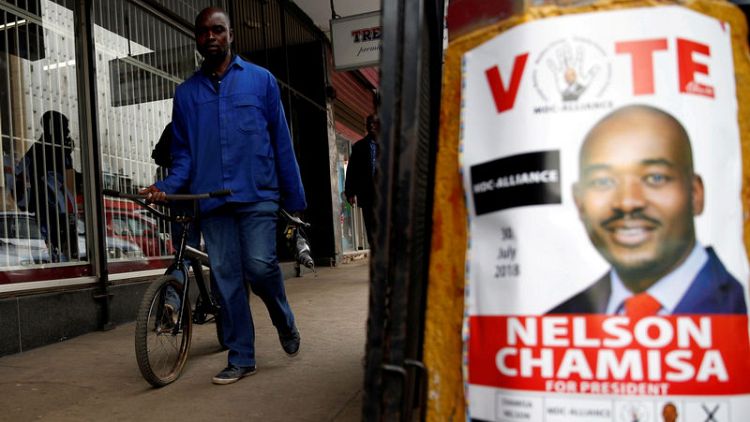By Joe Brock
HARARE (Reuters) - Whether you're a foreign investor, a Western diplomat or a Zimbabwean voter, the hope was that after Robert Mugabe was ousted last year there would be a 'free and fair' election.
Monday's contest between President Emmerson Mnangagwa, for a long time a Mugabe ally, and charismatic preacher, Nelson Chamisa, is too close to call, according to the latest polls, making a runoff on September 8 a real possibility.
There have been reports of intimidation and coercion, and state media is biased towards the ruling Zimbabwe African National Union-Patriotic Front (ZANU–PF) but there is consensus that the process has been better than before.
Mnangagwa, a 75-year-old former intelligence chief known as "the crocodile", has welcomed in foreign media and international observers from the EU, U.S. and the Commonwealth, while opposition parties have been freely allowed to campaign.
Observer groups have yet to give any initial assessments. While it may not be judged 'free and fair', analysts say it may be classed as 'good enough' when measured against the rigging and violent suppression that marred elections under Mugabe.
For Zimbabwe to re-engage with the West, end painful sanctions and secure the International Monetary Fund programme it needs to rebuild a moribund economy, it needs the observers to at least sign the vote off as credible.
"That verdict would be the gateway to a successful recovery from Zimbabwe's syndrome of crises. It is absolutely critical," said political analyst Eldred Masunungure.
Chamisa, 40, a trained lawyer fond of sharp suits, has already discredited the process. He accused the Zimbabwe Electoral Commission (ZEC) of bias, citing opaque ballot paper printing and a voters roll that includes dead people and children.
Chamisa's Movement For Democratic Change (MDC) has not said how it will respond to the alleged indiscretions. The ZEC has repeatedly defended its independence.
"It all depends on your benchmark," Masunungure said.
"If you ask Zimbabweans who have been through previous elections they will tell you this is the best they have seen in a long time. If you measure it against the international gold standard, you have an issue."
The most likely outcome, provided there is no blatant rigging or widespread violence, is observers will criticise lapses in the process without discrediting the vote, Western diplomats and analysts say.
"POISONED CHALICE"
"There is a feeling that the international community is going to soft peddle this election as acceptable, hiding behind the rubric of 'stability'," said Piers Pigou, senior consultant at International Crisis Group.
"It is a bit of a 'better the devil you know' situation but that's a dangerous game to play."
Mnangagwa, often referred to as "ED", has made a big effort to win over the international community; hosting Western ambassadors, courting foreign investors and even patching up relations with white commercial farmers who were violently evicted from their farms under Mugabe.
"I will vote for ED because he is mature and cares for this country a lot. He is a father figure," said Farai Rubowa, a watch repairman on the streets of Harare.
"This will be the most peaceful election in Africa and the opposition is running scared."
Chamisa, Zimbabwe's youngest ever presidential candidate, has been unable to keep the MDC united after winning a bitter leadership contest when the party's founder Morgan Tsvangirai died of cancer in February.
Yet he has surprised many with the speed at which he has gained public support, winning over the youth and unemployed voters disillusioned with the decades of ZANU-PF rule.
More than 40 percent of registered voters are under 35 and unemployment is estimated at over 90 percent.
"I know ZANU-PF is trying all sorts of tricks to rig but they will fail because we are tired of ZANU-PF lies," said 28-year-old street trader Jacob Shuvai.
"Chamisa will be very good for Zimbabwe, especially for us the youths."
Whoever wins the election will face the mammoth task of putting Zimbabwe back on track after 37 years of Mugabe's rule. Analysts say corruption, mismanagement and diplomatic isolation sent one of Africa's most promising economies into decline.
Zimbabwe's dire financial situation has arguably worsened under Mnangagwa, who pushed through huge civil service pay rises ahead of the election and has failed to address chronic cash shortages that are choking businesses and the poor.
"Reforms have been pushed behind the election curtain and the hole has been dug deeper, deeper and deeper," said Pigou.
"Whoever wins may be inheriting a poisoned chalice."
(Additional reporting by Macdonald Dzirutwe; editing by Anna Willard)
